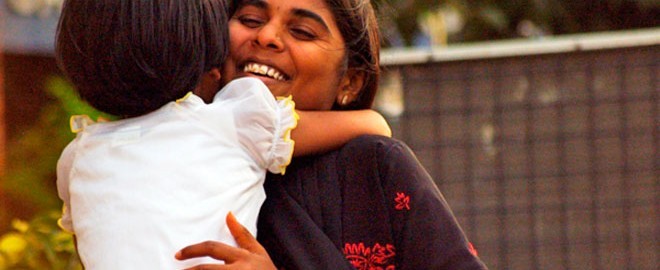Does your child know you love them?
When’s the last time you said: “I love you Jasmine/ Steven/ Amy, or hugged your child for no particular reason?
Children need and thrive on regular doses of unconditional love.
What is Unconditional Love?
This is love expressed or shown, which isn’t related to a particular act or behaviour (like doing their homework, or picking up their toys) – it’s ‘just because’ love!
Ultimately we all want to know that we are loved, for who we are, not for what we do.
Many parents say that soon after the birth of their baby, they ‘get’ what love is really about. You love that child, just because they exist. You nurture and nourish that baby – you gaze lovingly into their eyes, and connect!
Now, those beautiful babies grow up, to be, toddlers who are so wonderfully curious and excited about exploring their world, children who love achieving a skill in sport or at school, and teenagers who give you such pride because of their kindness towards others.
However we all know that there are times when that isn’t the case, and they are toddlers who throw the most amazing tantrums, children who question and argue about your decisions, and teenagers who sloth about! Somehow they don’t seem quite so loveable then! It seems hard to show love when you are confronted with a scowl – but here’s an important fact to remember…
‘Children need love the most when they deserve it the least!’
Hey, that’s probably true for us adults too – our sisters, our partners, maybe even the boss – because when people scowl, they are expressing their unhappiness, anger or frustrations, and they feel powerless to change the situation.
Think of the two year old who throws a tantrum because you said ‘No’, or the 14 year old who sulks off to her room because you won’t let her go to that party. They are both feeling powerless. And when we feel disempowered, we behave in a way that they know will be noticed.
At that point in time, the parents have a decision to make… Am I (the parent) going to act just like the child and respond by yelling/ arguing and gesturing (essentially a tantrum) or be the mature adult that I am, and deal with it calmly – It’s your choice. I can guarantee that behaving rationally gets better long term results! Yet, how many times have we thrown our own tantrums – arguing, shouting, threatening and waving our arms about?
What the child needs at that time is a rational parent – who calmly, yet ‘matter-of fact-ly’ re-states the rule – no blame, no put down, just a reminder of the acceptable way to behave.
‘Justin, I know you want a lolly now. The rule is no lollies after dinner.’
‘Sarah, I know you want to go to the party. The rule is no parties on a week night.’
At that point, that’s all that needs to be said.
Later, when peace is restored, reconnect with your child (for teenagers this may be several hours later). Give them a hug, ‘just because’. Don’t mention the issue again – it’s over. This is important – Just think, when your boss at work has told you that you did some thing poorly, or wrong, do you want him/her to continue to harp on about it? Yet often we do that with our children.
Does your child (the one that used to be that oh so loveable baby) go to bed every night knowing that they are loved. If not, it’s up to you, to see that they do.
Sonja Preston
“Remember to Play”
Image by subharnab via flickr









